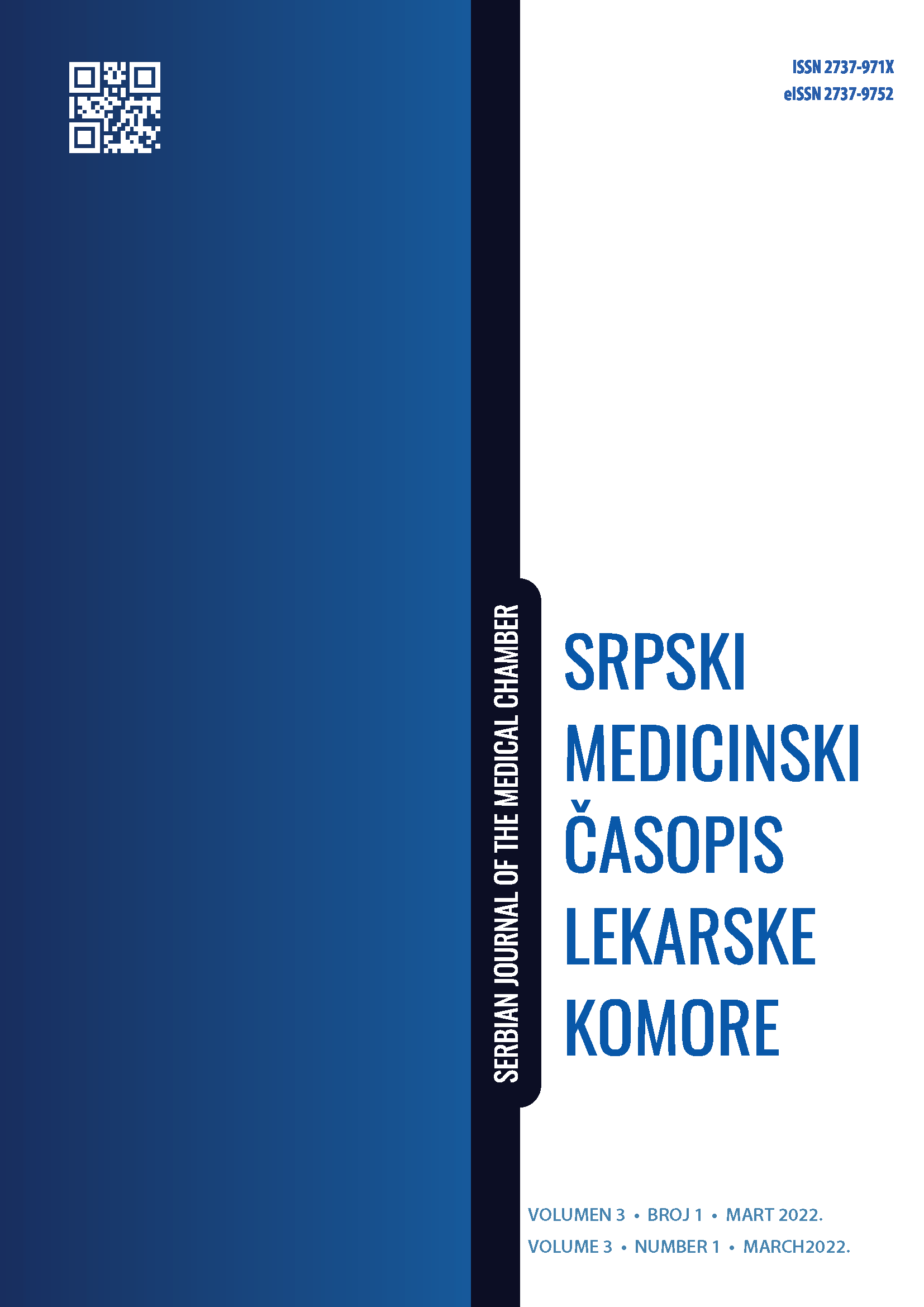INVESTIGATION OF THE RELATION BETWEEN THE TYPE AND TITER OF ANTIPHOSPHOLIPID ANTIBODIES AND THE CLINICAL MANIFESTATIONS OF ANTIPHOSPHOLIPID SYNDROME
Abstract
Introduction: Antiphospholipid syndrome (APS) is an autoimmune disorder manifested by arterial or venous thromboses and/or spontaneous abortions associated with a persistently elevated level of antiphospholipid antibodies. To date, no clear relationship has been established between levels and types of autoimmune antibodies and clinical manifestations of APS, which can range from mild coagulation disorders to life-threatening conditions.
Aim: The aim of this study is to examine the relation between antiphospholipid antibody type and titer and the most common clinical manifestations of APS.
Materials and methods: The retrospective study included 32 patients with a confirmed laboratory finding of elevated antiphospholipid antibodies, who came for follow-up examinations to the Hemophilia Unit of the University Clinical Center of Serbia, between June 1, 2017 and December 31, 2018. Data on patients were taken from their medical records. Basic demographic data, type and titer of antiphospholipid antibodies, and their association with the present clinical manifestations of APS were analyzed using standard statistical methods.
Results: There was no significant difference regarding the frequency of positive results for lupus anticoagulant, anti-cardiolipin, and anti-beta-2-GP-I antibodies, between the symptomatic and asymptomatic group. The percentage of persons with simultaneous positivity for two or all three antiphospholipid antibodies was the same in both groups of subjects.
Conclusion: As opposed to previous studies, our study did not demonstrate a correlation between the titer of antiphospholipid antibodies and the clinical manifestations of APS. Symptomatic and asymptomatic patients did not significantly differ in the frequency of elevated antibodies. These results indicate that the presence of other factors, which are as yet little-known, is necessary for the clinical manifestations of APS.
References
2. Khamashta MA, Amigo M-C. Antiphospholipid syndrome. Rheumatology. 2015;:1144–52.
3. Miyakis S, Lockshin MD, Atsumi T, Branch DW, Brey RL, Cervera R, et al. International consensus statement on an update of the classification criteria for definite antiphospholipid syndrome (APS). Journal of Thrombosis and Haemostasis. 2006;4(2):295–306.
4. Ginsburg KS, Liang MH, Newcomer L, GoldHaber SZ, Schur PH, Hennekens CH, et al. Anticardiolipin Antibodies and the Risk for Ischemic Stroke and Venous Thrombosis. Annals of Internal Medicine. 1992;117(12):997.
5. Juby AG, Davis P. Prevalence and disease associations of certain autoantibodies in elderly patients. Clin Invest Med 1998; 21:4–11.
6. Cervera R, Piette J-C, Font J, Khamashta MA, Shoenfeld Y, Camps MT, et al. Antiphospholipid syndrome: Clinical and immunologic manifestations and patterns of disease expression in a cohort of 1,000 patients. Arthritis & Rheumatism. 2002;46(4):1019–27.
7. Urbanus RT, Derksen RHWM, de Groot PG. Platelets and the antiphospholipid syndrome. Lupus. 2008;17(10):888–94.
8. Moore G. Recent Guidelines and Recommendations for Laboratory Detection of Lupus Anticoagulants. Seminars in Thrombosis and Hemostasis. 2014;40(02):163–71.
9. Wilson WA, Gharavi AE, Koike T, et al. International consensus statement on preliminary classification criteria for definite antiphospholipid syndrome: report of an international workshop. Arthritis Rheum 1999; 42(7):1309-11.
10. Chaturvedi S, McCrae KR. Diagnosis and management of the antiphospholipid syndrome. Blood Reviews. 2017;31(6):406–17.
11. Meroni PL, Borghi MO, Raschi E, Tedesco F. Pathogenesis of antiphospholipid syndrome: understanding the antibodies. Nature Reviews Rheumatology. 2011;7(6):330–9.
12. Galli M, Luciani D, Bertolini G, Barbui T. Lupus anticoagulants are stronger risk factors for thrombosis than anticardiolipin antibodies in the antiphospholipid syndrome: a systematic review of the literature. Blood. 2003;101(5):1827–32.
13. Galli M, Borrelli G, Jacobsen EM, Marfisi RM, Finazzi G, Marchioli R, et al. Clinical significance of different antiphospholipid antibodies in the WAPS (warfarin in the antiphospholipid syndrome) study. Blood. 2007;110(4):1178–83.
14. Pengo V, Ruffatti A, Legnani C, Gresele P, Barcellona D, Erba N, et al. Clinical course of high-risk patients diagnosed with antiphospholipid syndrome. Journal of Thrombosis and Haemostasis. 2010;8(2):237–42.

